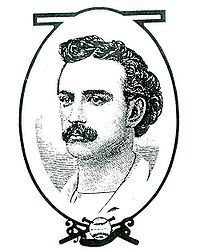|
By Joey Seymour
 SAN DIEGO—How is it that one of baseball’s earliest home run kings, the first man to be considered a “professional player,” and an early pioneer of the sport is not a member of the Baseball Hall of Fame? SAN DIEGO—How is it that one of baseball’s earliest home run kings, the first man to be considered a “professional player,” and an early pioneer of the sport is not a member of the Baseball Hall of Fame?
Such is the case of Lipman “Lip” Pike, the first known Jewish professional baseball player, shown in the Wikipedia photo at right.
Pike was born in New York on May 25th, 1845 to Emanuel and Jane Pike. And, as he grew, so did the sport of baseball – especially on the east coast. Along with his two brothers, Boaz and Israel, Lipman developed a passion for what would become America’s past time. All three brothers played baseball, which was entirely amateur during the mid-1800s. Yet, it was the middle brother, Lipman with his blinding speed and power, who began to make a name for himself.
Prior to the beginning of the 1866 season, Lipman became a member of the Philadelphia Athletics of the National Association (predecessors to the National League).
Controversy erupted - possibly baseball’s first - when it was discovered by the association that Lipman was earning $20 a week for playing. The scandal caused an uproar, and Pike was summoned to attend a hearing by the governing body of the National Association of Baseball Players. The issue was dropped however and the road paved for players to be openly paid by their teams (many had received under the table compensation prior to the hearing). In 1869, the Red Stockings of Cincinnati announced that each member of their team was in fact being paid, thus becoming the first professional team in baseball.
With the controversy behind him, Lipman was able to focus on baseball . . . and focus he did. In 1871, the National Association (N.A.) became a professional league. The documentation of Pike’s statistics began during this season as well. As team captain for the Troy Haymakers, Lipman had a .377 batting average and led the league in home runs and extra base hits. During the 1872-73 seasons as a member of the Baltimore Canaries, Lipman once again was crowned the home run champion, earning him three consecutive years as the league’s most powerful hitter, which is impressive, as he only stood 5 feet 8 inches tall and weighed a mere 158 pounds (similar to the San Diego Padres second baseman, David Eckstein, who is often referred to as “Little David”).
Lipman’s speed was something of legend as well. It has been reported that on August 16, 1873, he competed in a 100-yard sprint against a horse named Clarence…and won. The clocked time was ten seconds flat. Pike earned $250 for beating the horse. His speed on the diamond also served him well. In 1875 as a member of the St. Louis Brown Stockings, Pike stole an unprecedented 25 bases, occurring at a time when seasons were made up of only 70 games.
In 1876, the National League was formed. Pike remained a
Go to the top of right column
|
|
 member of the Brown Stockings and had himself another stellar offensive year. Defensively, Lip played every position besides pitcher and catcher and could seamlessly move from the infield to the outfield. In 1877, Pike found himself on yet another team as he joined the Cincinnati Reds. He led the league in home runs that season, capturing his fourth title in seven seasons. Yet, the 1877 season would be his last productive year. The Reds benched the then 32 year-old Pike, who found himself relegated to the minor leagues. member of the Brown Stockings and had himself another stellar offensive year. Defensively, Lip played every position besides pitcher and catcher and could seamlessly move from the infield to the outfield. In 1877, Pike found himself on yet another team as he joined the Cincinnati Reds. He led the league in home runs that season, capturing his fourth title in seven seasons. Yet, the 1877 season would be his last productive year. The Reds benched the then 32 year-old Pike, who found himself relegated to the minor leagues.
Out of professional baseball completely from 1882 – 1886, Pike went into the family business, haberdashery. He competed for a few amateur teams, but the sport to which he had dedicated himself solely, had all but given up on him.
The New York Metropolitans signed Pike in 1887. Wanting to give this vanguard of the sport a proper send off, the Mets called up Lipman for one game. On July 28th, 1887, Lip played in his final professional baseball game. He had four at bats, but did not register a hit. Regardless, the team honored all that Lipman Pike had done for professional baseball with this remarkable gesture.
Six years later, on October 10, 1893, Lipman Pike died of heart failure at the early age of forty-eight. According to his obituary in The Brooklyn Eagle on October 12, 1893, “Many wealthy Hebrews and men high in political and old time baseball circles attended the funeral services of the late Lipman E. Pike.” In 1985, Pike was inducted into the International Jewish Hall of Fame.
According to the rules for being inducted into the Baseball Hall of Fame, a player must be retired for five years and have played ten professional seasons. Lipman played exactly ten professional seasons (not including his amateur years). There is a window of sixteen years after a player’s career has ended in which he can be elected to the Hall of Fame. If the player is not elected during that time frame, their ability to get into the Hall falls to the Veterans Committee. The Veterans Committee states that they will consider, “Those whose careers entailed involvement as both players and managers/executives/umpires will be considered for their overall contribution to the game of Baseball; however, the specific category in which such individuals shall be considered will be determined by the role in which they were most prominent.”
As a trail blazer for the sport with an overall impressive career, Lipman Pike’s contribution to the game of Baseball is indubitable. The question remains, why hasn’t he been inducted in the Baseball Hall of Fame? He’s only been eligible for 117 years.
|

